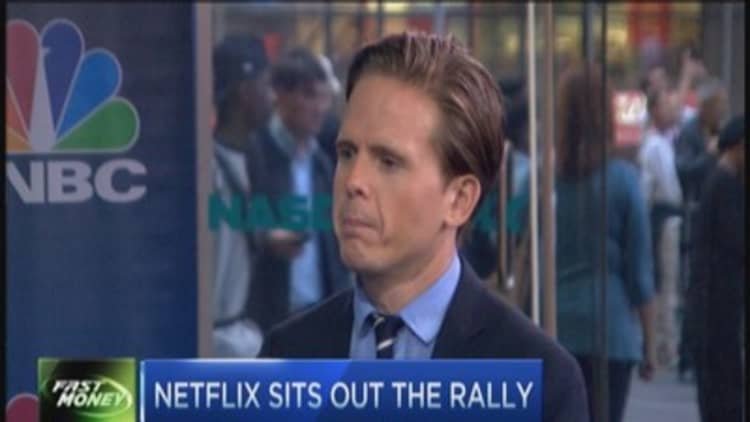
Netflix CEO Reed Hastings made a nasty crack about HBO chief Richard Plepler in January, when he suggested that his rival used "Netflix bitch" as a password on the video-streaming service. But on Wednesday, the joke was on Hastings.
The excitement started early in the day, when HBO parent Time Warner happened to schedule its annual investor presentation a few hours ahead of Netflix's third-quarter earnings release. The big news from the Time Warner meeting: HBO will make its content available outside of a cable package sometime next year.
In other words, HBO will be available as a standalone subscription project—just like Netflix. Until now, the two services have competed for somewhat different viewers because HBO is usually sold as part of a more extensive cable package. Netflix, of course, only requires an Internet connection.
Read MoreIs Wall Street tuning out CBS?
The news didn't immediately spook investors. While some feared that HBO would take Netflix's customers, those concerns were tempered by the belief that people could simply pony up an extra few bucks a month to buy both. After all, the two streaming services carry different shows, so movie and TV lovers might want to have it all. Netflix shares actually finished the day roughly flat.
Then came Netflix's results. Just after the market closed, the company issued an investor letter revealing its subscriber growth had missed forecasts in the third quarter. In seconds, the stock fell 26 percent to $333 a share (Netflix was trading 22 percent lower in early trading Thursday). Netflix declined to comment on this article.
What happened? According to the letter, the "primary cause" of the disappointing subscriber growth is a price increase implemented in May, when the normal subscription went to $8.99 a month from $7.99 a month. Netflix said the impact of the price hike may have been hidden for a couple of months because of excitement over its hit series Orange Is the New Black and so wasn't apparent until the third quarter.
Netflix has seen this movie before. In 2011, Netflix raised prices significantly and began to bleed subscribers. The stock plunged in the following months and Netflix ultimately issued shares at depressed prices to shore up its balance sheet.
While the recent customer reaction doesn't appear as violent, it is important because Netflix may soon face more intense competition. If Netflix customers are already sensitive to price, the presence of new competition may make it even harder to win them over. Netflix already has 36 million paid domestic subscribers versus 30.4 million for HBO, according to SNL Financial.
In fairness, Netflix has predicted that HBO and others would shift to Internet video for some time. It surely has a defense strategy in place to hang onto its customers.
And HBO has some work to do before launching its standalone service. The easiest way is probably by cooperating with cable providers, who have until now been resistant to offering channels outside of a more expensive bundle. But so long as HBO is also available within the bundle, it may be able to convince cable companies that additional standalone sales will outweigh any lost revenue from customers who cancel their subscriptions.
There are also some technical hurdles. At the moment, HBO has a "TV everywhere" service called HBO GO that's available over the Internet to people who subscribe to the cable channel. It doesn't stream every show live, and HBO would probably need to invest in technology to make the service more robust.
But assuming that those issues are resolved, it looks inevitable that HBO will offer a standalone service to reach more customers. After all, there are 10 million households that have broadband Internet service but don't subscribe to cable. A few million of those homes currently pay for streaming services like Netflix or Hulu, suggesting there's plenty of appetite for a standalone HBO.
What's more, other pay TV networks are bound to follow HBO's lead. CBS announced Thursday morning that it would offer access to all of the shows on its broadcast network for $5.99 a month. And CBS's Showtime looks poised to launch a standalone service.
Read More
"We are always looking at ways of expanding our audience, and it is certainly something that we have been examining for some time," a CBS spokesman said. "The subscription model is ideally positioned to take advantage of developing technologies in the consumer marketplace."

Earlier this week, Starz announced it plans to launch a standalone service overseas in 2015. "Premium networks such as Starz provide immense value to distributors as an [over-the-top] offering on top of broadband services," Starz CEO Chris Albrecht said. "We support more U.S. and international distributors making these offerings available to consumers."
Unfortunately for Netflix, all that competition could make it hard to raise prices in coming years. That's worrying, given how little cash the company generates from its business. In the third quarter, the company had negative free cash flow of $74 million.
At the same time, Netflix is investing aggressively in content to make its offering more compelling to subscribers. The company said its streaming content obligations rose to $8.9 billion at the end of the third quarter from $7.7 billion in the second quarter. At some point, Netflix needs to start making money to pay those bills.
With experienced competition on the horizon, Netflix investors should start asking the tough questions.

